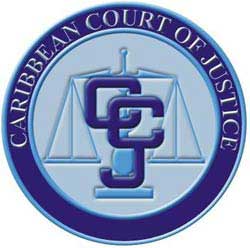AG Nandlall underscores CCJ’s indispensable role to regional integration
DOMINICA, yesterday, noted that it intends severing ties with the London Privy Council “this week” after the Parliament there approved of legislation allowing for it to adopt the Trinidad-based Caribbean Court of Justice (CCJ) as its final court.
Prime Minister Roosevelt Skerrit, according to the Caribbean Media Corporation (CMC), stated that the island would move swiftly in adopting the CCJ, established in 2001 by regional Governments.
Guyana’s Attorney-General and Minister of Legal Affairs, Anil Nandlall, in an invited comment, noted that this decision is a welcomed one.
“Guyana, as one of the first to embrace the CCJ as our final appellate Court, most naturally is pleased to note Dominica’s acceptance of the Court as their final court of appeal, thereby severing their century old connection with Her Majesty’s Privy Council,” he said.
Nandlall referenced the inaugural address to the Caribbean Community (CARICOM) Heads by President Donald Ramotar in 2012, where the Guyanese Head of State issued a call for all CARICOM member states to accept the CCJ as their Final appellate court.
“As a Caribbean people seeking to forge an integrated community and a single market and economy, the quicker we accept that the CCJ is not only an indispensable factor in the equation but an inevitability, it would be better for us and the integration process we strive so strenuously to build” – Attorney General Anil Nandlall
The AG said, “The Government and people of Dominica should therefore be congratulated for this monumental step. It is hoped that other member states of CARICOM would emulate and do so quickly.
“As a Caribbean people seeking to forge an integrated community and a single market and economy, the quicker we accept that the CCJ is not only an indispensable factor in the equation but an inevitability, it would be better for us and the integration process we strive so strenuously to build.”
REPEATED CALL
Dominica’s move follows the repeated call for the replacement of the Privy Council with the CCJ, by the newly-elected Prime Minister of Antigua and Barbuda, Gaston Browne, in his first address at the ongoing CARICOM Conference of Heads of Government.
He stressed that the Region can “never be truly independent” while its final appellate court is the court of its “former colonial masters” – the United Kingdom’s (UK) Privy Council.
 “The decisions of the Caribbean Court of Justice (CCJ), thus far, can only bolster our confidence in the quality of the jurisprudence that emanates from the Court,” said Prime Minister Browne, who took over the reins of Chairmanship of CARICOM at Tuesday’s opening of the 35th meeting of the Region’s Heads.
“The decisions of the Caribbean Court of Justice (CCJ), thus far, can only bolster our confidence in the quality of the jurisprudence that emanates from the Court,” said Prime Minister Browne, who took over the reins of Chairmanship of CARICOM at Tuesday’s opening of the 35th meeting of the Region’s Heads.
He stated that Antigua and Barbuda will lead the way on this issue and “will not loiter” in demonstrating confidence in the CCJ.
“(We) will take steps, in conjunction with our OECS sister states, to join the appellate jurisdiction of the Caribbean Court of Justice,” Prime Minister Browne said.
According to him, the CCJ as the Court of Final Appeal replacing the Judicial Committee of the British Privy Council is a must.
He said, “It is my Government’s intention to hold the referendum required by the Constitution to make this possible as soon as practicable…we can never be truly independent in the region while our final appellate court is the court of our former colonial masters.”
INTEGRAL TO REGIONAL GOVERNANCE
The CARICOM Chair added that the CCJ is an important aspect of CARICOM’s regional governance, as well as will aid in supporting the establishment of our judicial independence.
He said, “I am not so dewy-eyed and naïve not to appreciate the challenges that Governments face in balancing competing interests in all their societies. I congratulate my colleagues who, notwithstanding the obstacles, have kept the faith in advancing our Caribbean Community.
“Let us all commit ourselves to the removal of all barriers to free movement and to accelerate the strengthening of the CARICOM Secretariat to perfect and advance the Single Market and Economy.”
Browne stressed that advancing the integration movement cannot be achieved by waiting for the most reluctant of countries in the Region to act.
“If we are serious about CARICOM as an instrument for the development of our countries and of the region, we should focus on a priority action plan that is strategically linked to achieving the core objectives of the single market and economy,” he said.
The CARICOM Chair maintained that CARICOM Member States must re-commit to accelerate the integration process.
The CCJ, which has both an original and appellate jurisdiction, also acts as an international tribunal interpreting the revised Treaty of Chaguaramas that governs the regional integration movement, CARICOM.
(By Vanessa Narine )

